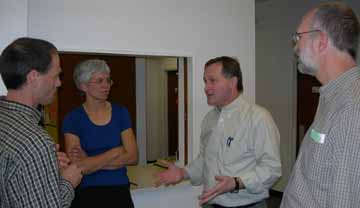Canadian Mennonite
Volume 12, No. 12
June 9, 2008
Reaching out
Home Street Mennonite’s ‘Third Usher’ program makes the homeless welcome at church
Winnipeg
 |
Four years ago a few members of Home Street Mennonite Church committed themselves to getting to know their church’s neighbourhood, a low-income area in the core of the city. Homeless or transient people would frequently stop by for a hand-out, but little was known about the people who lived in the neighbourhood.
The group refers to that initial study year as its “mustard seed year,” from which the seed of an idea would germinate and take root. Members spent the year visiting social agencies in the area, inviting in local leaders, doing some volunteer work, participating in a neighbourhood clean-up and going for neighbourhood walks.
“At the end of that year we looked at what we had learned and what we could do more intentionally about how we welcome guests on a Sunday morning,” says Judith Friesen-Epp of the experience. “We decided to offer them a place to sit, to offer them coffee and a bit of food—but not hand-outs. We wanted to make it relational. We didn’t know if they would stop coming, but people have come in droves, some very regularly.”
For the past three years, members of the small group, known as the “Third Usher,” have taken turns bringing food, preparing coffee and welcoming those who come by every Sunday morning before worship. The visitors share the basement space with children who begin their Sunday school hour with lively singing. Sipping coffee, eating bread and cheese, and visiting with each other, the visitors seem to feel at home amidst the usual flurry of activity.
The Third Ushers—and occasionally others from the congregation—sit at the round tables with the visitors and listen to their stories, look at stained and faded photos pulled out of plastic bags, or hear exchanges about what transpired in the past week. Those who are homeless and transient often talk about families they haven’t seen for years, the Third Ushers learned.
“There is an oral culture on the street,” says Judith. “Almost every Sunday new people come by.”
Occasionally some find their way up into the sanctuary and join the congregation for worship.
“They have participated in sharing time and in communion. There have been some very poignant moments,” notes Judith, recalling one communion when “one of our low-income aboriginal people slid into the pew beside me to have communion with me. There is so much that separates who we are, but here we were, united in the act of communion.”
Arlyn Friesen-Epp adds that there have been other such poignant moments: “We’ve heard stories of sharing when there is so little to share, the story of the death of a son, the need to forgive.”
“Many of their lives are fraught with trag-
edy and yet there is community there, and we get occasional glimpses into it. So many biblical stories just spring to life in the table conversations,” says Arlyn as he recalls the time a woman embraced her son’s killer.
An important part of the Third Usher group is the monthly meetings when members take time to reflect biblically and share about their Sunday morning encounters. There have been challenges bridging the different cultures and worlds, they acknowledge.
“It’s more than coffee. They come to share significant news, like ‘my brother died,’ or they come asking for prayer,” says Judith.
Although Third Usher grew out of the initiative of a small group, it receives the support of the congregation.
“In the past there was little consistency in how we would respond as a church to the people who showed up at our door,” says Byron Rempel-Burkholder. “Now there is greater consistency and also a sense of security for everyone.”
The ongoing work and reflection of this group—currently comprising seven official members—is resulting in more mustard seeds being planted. It has organized open meetings to discuss and learn more about food security and food justice issues. Many in the congregation have responded with interest and even passion.